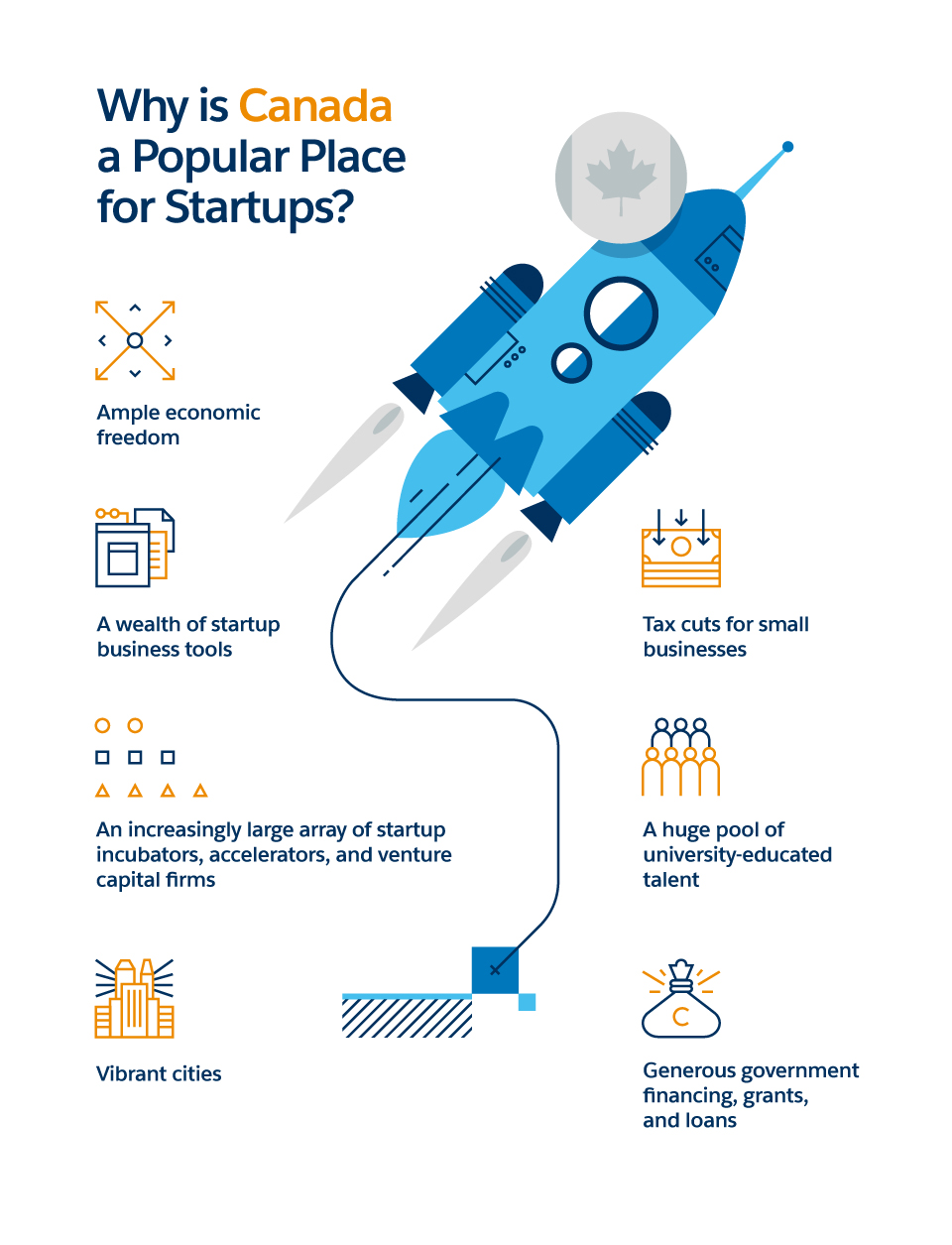The United States’ entrepreneurial scene may earn much of the world’s attention, but Canada is steadily increasing its share of the startup pie.
Depending on which source you consult, the Great North is home to up to four of the world’s top 100 cities for startups (namely, Toronto, Montreal, Vancouver, and Victoria), and it’s been ranked as the third best country in the world for starting a new business after the United States and the United Kingdom. This may not come as a surprise when you consider that Canada has given birth to some of today’s most innovative and fastest growing tech companies.
There are plenty of good reasons to start a company in Canada, including:
- Ample economic freedom
- Generous government financing, grants, and loans
- Tax cuts for small businesses
- A wealth of startup business tools (which include Salesforce)
- Vibrant cities
- A huge pool of university-educated talent
- An increasingly large array of startup incubators, accelerators, and venture capital firms
To date, Canada’s top 20 accelerators and incubators have attracted more than $1.7 billion in follow-on investments and contributed to the creation of over 10,000 new jobs. A number of large firms in Canada (including OMERS Ventures and BDC Capital) have poured hundreds of millions of dollars into Canadian startups, and the Canadian venture capital market and incubator and accelerator scenes will only continue to grow.
Bottom line? It’s a great time to be a startup in Canada, and one of the best ways to ensure your success is by joining a startup incubator or accelerator program. Let’s take a deep dive into what these programs are all about, and how to find the right one for your startup.
Why is Canada a Popular Place for Startups?
- Ample economic freedom
- Generous government financing, grants, and loans
- Tax cuts for small businesses
- A wealth of startup business tools
- Vibrant cities
- A huge pool of university-educated talent
- An increasingly large array of startup incubators, accelerators, and venture capital firms

What is a startup incubator or startup accelerator?
Before pursuing support from a startup incubator or accelerator, it’s important to be clear about what exactly these programs can do for you.
In its most general terms, an incubator is a program designed to increase early-stage companies’ chances of success via mentorship, financial investment, and perhaps additional forms of support such as office space, access to technical resources, and so on.
Companies that are qualified to sign on with incubators are generally looking for guidance and support around developing their business models and other foundational elements of running a company. They may remain in the incubator program for anywhere from a few months to a few years. The ultimate goal is for companies to “graduate” from the program fully equipped to run successfully on their own.
Incubators take different forms or organize themselves around different themes. For instance, some incubators function much like non-profits, while others offer investments in exchange for partial equity in participating startups. Some incubators cater generally to any startups in their region, while others focus on startups in a particular industry, such as software or technology.
Meanwhile, companies that have moved beyond the earliest stages of development can seek support from a startup accelerator. Like startup incubators, these programs typically offer mentorship, financial investment, and other resources to startups with the goal of ensuring these companies’ long-term sustainability and success.
To that end, business accelerators usually take one of two primary forms.
Seed programs assist startups that are barely past the incubator stage in refining their business plans and developing their fundraising pitches for investors. These programs typically run for two to four months.
Second-stage programs target companies that are beyond the seed program stage and offer them support in the form of networking and other growth opportunities. These programs may last for up to six months.
As you can see, while incubator programs can run for anywhere from several months to a few years, accelerators tend to move more quickly, with an average program length of two to six months. Like incubators, accelerators are often organized around a particular region or sector.
Programs Startups Can Use in Canada to Help Them Succeed
- Incubator
- For startups looking for guidance and support regarding:
- Developing their business models
- Foundational elements of running a company
- Last a few months to a few years
- For startups looking for guidance and support regarding:
- Accelerator
- For mature startups
- Average program length of 2–6 months
- Two common types
- Seed program, for startups just out of incubator programs
- Second-stage program, for startups beyond the seed program stage

How to find startup incubators and accelerators in Canada
Now that you’re clear on what startup incubators and accelerators are all about, it’ll be easier to narrow down your search for the right program for your company. Here’s how to go about it.
Start by clarifying whether you should target incubators or accelerators.
Consider which type of program is right for your company. For the most part, it comes down to the stage your startup is currently in. Early-stage startups should probably focus on getting into an incubator program, while more mature startups will want to set their sights on accelerators. Once you’ve clarified which type is right for you, you’ll be able to refine your search for the right program.
If you have a university affiliation, investigate your school’s resources.
Many Canadian universities have developed or are in the process of developing incubator programs to support their students’ startup aspirations. If you’re affiliated with a university that has its own, this may be a great place to pursue personalized support and enjoy substantial networking opportunities.
For instance, Ryerson University is home to the Digital Media Zone (DMZ), which offers a combined incubator/accelerator program and has supported over 130 companies to date. Other colleges and universities with dedicated startup programs include Brock University, Canadore College, Carlton University, Centennial College, Georgian College, McMaster University, Queen’s University, the Universities of Toronto and Waterloo, and many more.
Consider government support.
The Canadian government is heavily invested in nurturing startups, and it’s putting its money where its mouth is: There are currently a large number of government grants and loans available to small businesses. While not all of these take the form of a traditional startup incubator, if you’re primarily interested in seed capital, it may be worth investigating government funding. It’s also a good idea to research and take advantage of other ways in which the government supports startups, from tax credits to wage subsidies and startup visas.
Go where there’s support for your sector.
It may be a smart idea to pursue support in regions that are known for investing in your niche. For instance, Waterloo has a reputation for supporting tech companies (think of it as the Silicon Valley of Canada). Vancouver is another tech hub, Montreal nurtures artificial intelligence startups, SaaS companies tend to congregate in Ottawa, and Labrador and Newfoundland are known for supporting grassroots startups.
Bottom line? If companies of a certain type are congregating in a given city or region, that’s a good sign that the area supports that sector via incubators, accelerators, and other programs.
The Canadian Government Helps Startups
- Local tax breaks, credits, and refunds
- Grants
- Subsidizes or covers the hiring of students, recent college grads, and apprentices
- Dozens of different business loans
- Start-up visa

Network at startup events.
If you want to learn about the best incubator programs for your company, there’s no better resource than founders who have been where you are. Connecting with founders in your sector who have researched or been through different programs is a great way to get some valuable intel. Find other founders at events that are expressly targeted toward Canadian startups. Great networking opportunities across Canada include Edmonton’s Startup Week, Montreal’s Startupfest and numerous Startup Weekends, and Vancouver’s Traction Conference.
When in doubt, look to the big cities.
No surprise here: Major cities tend to offer the most resources for up-and-coming startups — which is not to say it’s impossible to find incubators beyond these urban hubs.
Edmonton is home to Business Link, which offers free resources and support for startups, and TEC Edmonton, an incubator that’s earned international acclaim.
Montreal boasts a VC-backed accelerator in the form of FounderFuel, which offers mentorship and funding over the course of a four-month residency, as well as a peer-to-peer support group for startup founders dubbed Entrepreneurs Anonymous.
Ontario is host to the Ontario Network of Entrepreneurs (ONE), a government program that supports startups at all stages by nurturing a network of 49 incubators and accelerators.
Ottawa features the economic development group Invest Ottawa, which offers skill-building programs for entrepreneurs. There’s also The Natural Resources Canada Innovation Acceleration Centre, a seed accelerator for early-stage companies across a number of industries.
Toronto is home to Maple Leaf Angels, which invests in early-stage startups; the MaRS Discovery District, which boasts a network of 1,000-plus startups and skills training for entrepreneurs; OMERS Ventures, a VC firm that backs the likes of Shopify; and more than 4,000 startups.
Vancouver boasts a $100 million government fund for early-stage startups and the BC Tech Association, which offers a number of opportunities for regional tech companies.
To further refine your search, check out the incubator and accelerator roundups at Fundica, F6S, Mentornity, Crunchbase, and Salesforce’s list of Canadian startup programs.
There are hundreds of startup incubators and accelerators across Canada, and that means startups enjoy plenty of choice when it comes to finding the program that will best set them up for success. If you’re turned away from an incubator or you’re struggling to find one that meshes with your business, don’t give up hope. Keep digging until you find a program that seems well suited to your startup and its aims, because the odds are good that it does exist.
Share "How to Find Startup Incubators and Accelerators in Canada" On Your Site



